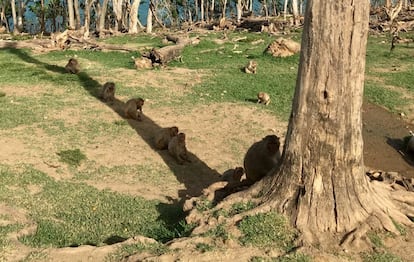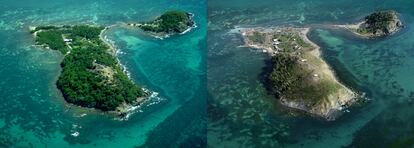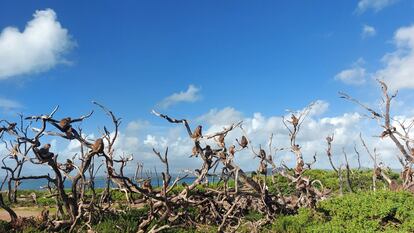Tolerant monkeys that shared shade after a hurricane increased their life expectancy
These macaques reduced their chances of dying by almost half after become more accepting of others and of sharing scarce resources

In 2017, Hurricane Maria devastated Puerto Rico, killing thousands of people. It entered from the southwest, first destroying Cayo Santiago, a small island that is home to hundreds of rhesus macaques (Macaca mulatta). For almost a century, they have been studied by biologists from all over the world. After the disaster, scientists found that these monkeys — one of the most violent primate species — had become more tolerance towards others and less aggressive. Now, in the second part of this work, published in Science, researchers have shown how animals that became more tolerant by sharing their main resource — the shade — have increased their life expectancy by almost 50%.
In Cayo Santiago — also known as Monkey Island — the temperature in the middle of the day exceeds 40ºC (104ºF) almost all year round. Photographs (see below) of the island before the hurricane hit show that it was practically completely covered with trees. But the category-4 Hurricane Maria, it was covered with the bare trunks of dead trees. Years later, the island still has not recovered its tree coverage. So shade — where the temperature is up to 7ºC (44.6ºF) cooler — has become a scarce resource. There wasn’t enough shade for everyone. And scientists feared the worst.
“We expected that the monkeys would become more aggressive by competing for shade, given that this is a society known for its aggressiveness,” says Lauren Brent, a professor of ethology at the Animal Behavior Research Center at the University of Exeter and senior author of the research. They were wrong: “Instead, they became more tolerant of others and less aggressive.” Using data from the seven groups that made up of a total of 790 adult macaques, focusing on figures from the five years before Hurricane Maria and the five years after, the researchers observed that social tolerance tripled (measured as the acceptance of the presence of another specimen less than two meters away) after Maria.

According to 2023 data — the last available — social tolerance has fallen slightly, but still remains double what it was before the hurricane. Acts of aggression — common in this species — have also remained well below pre-hurricane levels. The population density on Monkey Island is very high, similar to that of a city like New York (with more than 10,000 inhabitants per km²). But it has remained the same during the decade under study, so this wouldn’t explain the changes seen in the macaques’ sociability.
This represents a sudden change in selective pressure, in the benefits or costs of traits or behaviors, within a very aggressive and hierarchical society. The climate crisis has led to a rise in extreme weather events, including hurricanes, which are profoundly altering ecosystems. Such a widespread transformation cannot be validated in a laboratory. Natural experiments like this are a unique opportunity for researchers. Therefore, they looked for the consequences of increased sociability and decreased aggressiveness on the adaptive aptitude of macaques. On this occasion, environmental degradation would have altered the adaptive value of increased social tolerance. With what result?
The researchers studied 431 adults and their proximity networks after Hurricane Maria. They found that 155 of the monkeys — which have an average life expectancy of about 25 years (and no predators) — had died after the hurricane. When they reviewed the files for the period before the disaster — between 2013 and September 2017 — they saw that out of 617 adults, 111 had died in that period. The absolute numbers do not provide much insight, as many died in the days after the hurricane. The key is which monkeys died.

Camille Testard, researcher at University of Pennsylvania and lead author of the study, describes what they discovered: “We had the behavioral and survival data [whether or not the monkeys died during the study period] for all individuals. We were able to model the relationship between the sociability of individuals and their probability of survival.”
The researchers found that after the hurricane, monkeys that were more tolerant of others, sharing shade, were more likely to survive. Specifically, 42% more likely. “This was not the case before the disaster, when whether a monkey was tolerant or not did not predict its survival,” adds Testard. “We believe that the face that more monkeys are tolerant facilitates access to shade, which is now a scarce resource, allowing better thermoregulation and ultimately better chances of survival.”
The need to share the shade in the blazing heat of the midday sun strengthened social ties. Researchers also saw this tolerance of others during the early hours of the morning, although to a lesser degree. However, it was still far higher than during the pre-Maria period. “To access the shade, they need to tolerate (and be tolerated by) others, and we found that this tolerance extends to other daily interactions,” says Testard.
Regarding the logic behind the change, her colleague Brent recalls that “competing for shade is different from competing for food, for example.” And the difference is in the type of social relationship that is required. “Tolerating others doesn’t cost much. Unlike supporting someone in a fight, you are very unlikely to get hurt or expend a lot of energy tolerating others, so you don’t need to invest a lot in someone to create a relationship in which you tolerate others,” she explains.
It may also be a strategic calculation: “When there are few shady places to sit, your best friend may not be sitting in the shade, which means you can’t either. But one of your 10 acquaintances could be, which means you can too,” says Brent. “Getting shade is a numbers game in which it is better to tolerate others than to lock yourself in small competitive social groups.”
As for whether this behavior will endure, researchers will have to wait until Cayo Santiago recovers its vegetation. But Brent wants to highlight the adaptability of these monkeys. “For animals that live in groups, social relationships can allow them to cope with environmental perturbations, including human-induced climate change. The lesson we can learn from this is that we need our social relationships to help us overcome life’s major challenges, and being tolerant of others can lead to biological success.”
Sign up for our weekly newsletter to get more English-language news coverage from EL PAÍS USA Edition
Tu suscripción se está usando en otro dispositivo
¿Quieres añadir otro usuario a tu suscripción?
Si continúas leyendo en este dispositivo, no se podrá leer en el otro.
FlechaTu suscripción se está usando en otro dispositivo y solo puedes acceder a EL PAÍS desde un dispositivo a la vez.
Si quieres compartir tu cuenta, cambia tu suscripción a la modalidad Premium, así podrás añadir otro usuario. Cada uno accederá con su propia cuenta de email, lo que os permitirá personalizar vuestra experiencia en EL PAÍS.
¿Tienes una suscripción de empresa? Accede aquí para contratar más cuentas.
En el caso de no saber quién está usando tu cuenta, te recomendamos cambiar tu contraseña aquí.
Si decides continuar compartiendo tu cuenta, este mensaje se mostrará en tu dispositivo y en el de la otra persona que está usando tu cuenta de forma indefinida, afectando a tu experiencia de lectura. Puedes consultar aquí los términos y condiciones de la suscripción digital.









































